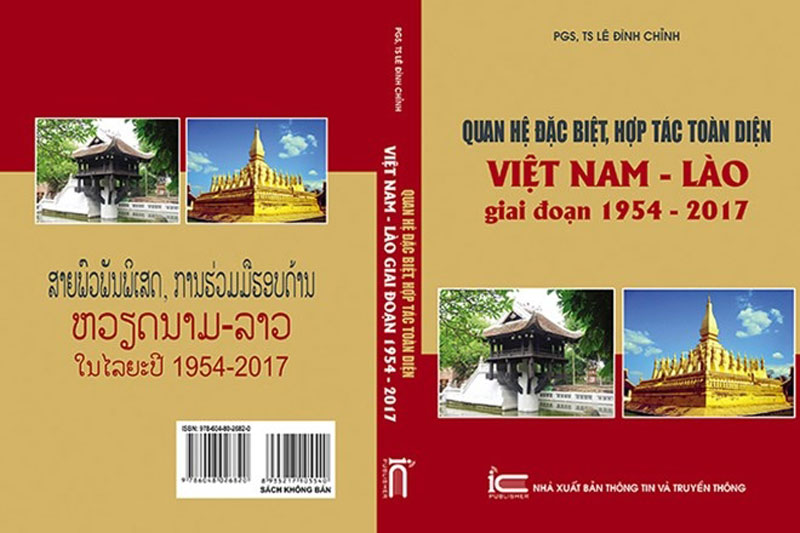
A set of books on Vietnam-Laos special relations has been introduced to the public by the Information and Communications Publishing House.

Cover of a book on Vietnam-Laos
special relations.
The set contains 11 books which give readers an insight into
Laos as well as its people, socio-economic situation and culture.
The books also analyse the relationship between Vietnam and
Laos in the past, at present, as well as future prospects.
The set of books is expected to realise the guideline and
foreign policy of the Vietnamese Party and State in further consolidating and
developing the special solidarity and comprehensive cooperation between Vietnam
and Laos as recommended by President Ho Chi Minh.
The books were compiled in 2017 when the two countries
celebrated 40 years since they signed a Treaty of Amity and Cooperation (July
18), and the 55th anniversary of diplomatic ties (September 5).
The Vietnam-Laos relations were founded by Vietnamese President Ho Chi
Minh and his Lao counterpart Kaysone Phomvihane and have been nurtured by
generations of leaders and people of the two countries over the past more than
seven decades, becoming a valuable treasure of the two nations.
Source: NDO
With an increasingly vibrant and widespread emulation movement aimed at building cultured residential areas and cultured families, Yen Thuy District has been making steady progress toward improving both the material and spiritual well-being of its people, while fostering a civilized, prosperous, beautiful, and progressive community.
Once lacking recreational spaces and community facilities, Residential Group 2 in Quynh Lam Ward (Hoa Binh City) has recently received attention for the construction of a new, spacious, and fully equipped cultural house. The project followed the model of state support combined with public contributions in both labor and funding.
The "All people unite to build cultural life" movement, which has been effectively integrated with Kim Boi district’s socio-economic development goals, is fostering a lively spirit of emulation across local residential areas, hamlets, villages, public agencies, and enterprises. In addition, through the initiative, traditional cultural values are being preserved and promoted, while community solidarity and mutual support in poverty reduction and economic development are being strengthened.
A working delegation of the Hoa Binh provincial People’s Committee led by its Permanent Vice Chairman Nguyen Van Toan on June 11 inspected the progress of a project to build the Mo Muong Cultural Heritage Conservation Space linked to tourism services in Hop Phong commune, Cao Phong district.
Born and growing in the heroic land of Muong Dong, Dinh Thi Kieu Dung, a resident in Bo town of Kim Boi district, in her childhood was nurtured by the sweet lullabies of her grandmother and mother. These melodies deeply imprinted on her soul, becoming an inseparable part of her love for her ethnic group's culture. For over 20 years, this love for her hometown has driven Dung to research, collect, and pass down the cultural values of the Muong people to future generations.
In the final days of May, the Ethnic Art Troupe of Hoa Binh Province organized performances to serve the people in remote, mountainous, and particularly disadvantaged areas within the province. These were not just ordinary artistic shows, but they were the meaningful journeys aimed at spreading cultural values, enhancing the spiritual life of the people and contributing to the preservation of ethnic minority cultural identities.



